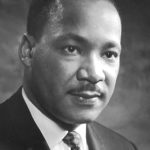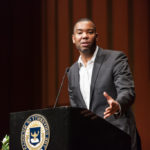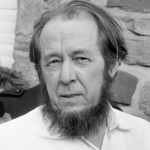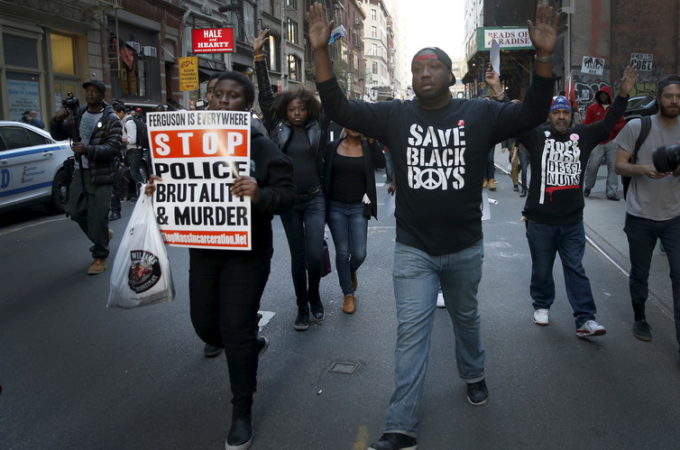There can be no doubt that race relations in America have deteriorated in recent years. I’ve reflected deeply on what has led to this tragic situation, and the answer I’ve come to is worldview.

The basic worldview assumptions that animated the Civil Rights movement—assumptions that led to incredibly positive changes, are slowly being replaced by an entirely new set of worldview assumptions. Because of this, race relations have taken a distinctly negative turn, and the gains of previous generations are under threat.
Martin Luther King gave voice to the older worldview. The new worldview has many champions, but perhaps none as influential as author and essayist Ta-Nehisi Coates. For those unfamiliar with Coates, h e is a native of Baltimore. His beloved father was active in the Black Panther Party—a revolutionary socialist organization active in the 60s and 70s. He attended the historically black Howard University in Washington DC, and today, he works primarily as a writer. His powerful and creatively-written essays appear in the Atlantic, the New York Times and the Washington Post. Perhaps his most famous book, Between the World and Me, won the 2015 National Book Award for nonfiction.
e is a native of Baltimore. His beloved father was active in the Black Panther Party—a revolutionary socialist organization active in the 60s and 70s. He attended the historically black Howard University in Washington DC, and today, he works primarily as a writer. His powerful and creatively-written essays appear in the Atlantic, the New York Times and the Washington Post. Perhaps his most famous book, Between the World and Me, won the 2015 National Book Award for nonfiction.
Carlos Lozada of the Washington Post described Coates as America’s foremost “public intellectual.” New York Times editorialist A.O. Scott goes further: “‘Must read’ doesn’t even come close. [His writing] is essential, like water or air.”
Because ideas matter, Coates’s worldview needs to be taken seriously, for they are having a profound effect on the culture. Indeed, they are driving the discussion of race in America in 2018. And while Coates is at home on the far left end of the political spectrum, he has a surprisingly large number of evangelical advocates and champions. With that, here’s a short worldview analysis of Coates and King. Their very different beliefs result in very different consequences.
Ultimate Reality
King was a Baptist minister who operated from a biblical set of assumptions about God, human nature, and history. His powerful speeches, letters and books are among the most hopeful, stirring, inspirational and prophetic in American history.
Coates is an outspoken atheist, who often describes the world as “chaotic.” His atheism colors his writing with hopelessness, anger and resentment. His brand of atheism is heavily influenced by postmodernism, which reveals itself in a number of ways, particularly a willingness to push narrative at the cost of truth. Whether expounding on America’s history, or on issues such as policing or criminal justice, his tendency is to spotlight facts and evidence that support his narrative and whitewash those that don’t. As a result, the picture he paints is highly distorted.
Human Nature (Anthropology)
King, as a Christian, held to an orthodox, biblical view of human nature. All people are created by God, in His image, with dignity, inherent value and inalienable rights. Yes, there are different ethnicities, but King believed in a human nature that transcends ethnicity. One that unites all people regardless of skin color. For King, all people are children of God, whether “yellow, black or white, all are precious in His sight.” He famously said: “We must learn to live together as brothers or perish together as fools.” Perhaps most famously, he said: “I have a dream that my four little children will one day live in a nation where they will not be judged by the color of their skin, but by the content of their character.”
Coates’s view of human identity is radically different. He absolutizes the forces of culture and community. Nancy Pearcey describes this postmodern anthropology: “Individuals are little more than mouthpieces for communities based on race, class, gender, ethnicity, and sexual identity.” For Coates, there is no common “human nature” that binds us together. Rather, our identity is determined entirely by ethnicity. Given this, there is little room for individuality, volition or personal responsibility. Commenting on this, Rich Lowry writes that Coates “gives the impression of denying the moral agency of blacks, who are uniformly portrayed as products of forces beyond their control.” In short, for Coates, the individual means very little. The group defines everything.
In one of his most controversial statements, Coates describes to his son his reaction to watching the New York City police and fire fighters rush into the World Trade Center buildings on 9-11. “They were not human to me. Black, white, or whatever, they were menaces of nature; they were the fire, the comet, the storm, which could—with no justification—shatter my body” (italics added).
Here you see not only Coates’s disdain for the police and firefighters who sacrificed their lives on 9-11, but also his inability to see people as individuals—as fellow human beings. His worldview reduces them to subhuman representatives of oppressive groups.
The Source of Evil
 King would no doubt agree with the famous Russian novelist Aleksandr Solzhenitsyn who said “the line between good and evil runs through every human heart.” He would affirm that “all have sinned, and fallen short of the glory of God” (Romans 3:23). Indeed, this is part of our common human identity. We are all sinners in need of a Savior. The source of evil isn’t of human origin. “We do not wrestle against flesh and blood, but against the rulers, against the authorities, against the cosmic powers over this present darkness, against the spiritual forces of evil in the heavenly places” (Ephesians 6:12).
King would no doubt agree with the famous Russian novelist Aleksandr Solzhenitsyn who said “the line between good and evil runs through every human heart.” He would affirm that “all have sinned, and fallen short of the glory of God” (Romans 3:23). Indeed, this is part of our common human identity. We are all sinners in need of a Savior. The source of evil isn’t of human origin. “We do not wrestle against flesh and blood, but against the rulers, against the authorities, against the cosmic powers over this present darkness, against the spiritual forces of evil in the heavenly places” (Ephesians 6:12).
But for Coates, the line between good and evil runs between groups—in his case between whites and everyone else. In this, he channels the ideas of Karl Marx’s disciple Antonio Gramsci. The world is divided between oppressor groups and victim groups; nothing exists outside these categories. For Coates, to be white is to be defined as part of an oppressive group. To be black is to be a victim of white oppression. Society as a whole is structured to preserve white power. “White privilege” which has recently entered our collective lexicon, is just a short-hand way of describing this.
“White America is a syndicate arrayed to protect its exclusive power to dominate and control our [black] bodies” writes Coates in Between the World and Me. “However it appears, the power of domination and exclusion is central to the belief in being white, and without it, ‘white people’ would cease to exist for want of reasons.” Indeed, the equating of “whiteness” with evil is a central theme in Coates’s writing. For him, whiteness, in all its falsity, is parasitical on blackness, in all its authenticity. It is a kind of bloodsucking subhumanity. “Whiteness” Coates tells us, “[is] an existential danger to the country and the world.” Quoting his hero, black essayist and cultural critic James Baldwin, he writes: “whites have brought humanity to the edge of oblivion because they think they are white.”
Merriam-Webster defines racism as “a belief that race is the primary determinant of human traits and capacities and that racial differences produce an inherent superiority of a particular race.” By sourcing evil in “whiteness,” Coates reveals his worldview to be racist. That so many affirm Coates’s assumptions today is likely the single biggest reason for the deterioration of race relations in America.
- Scott Allen
… to be continued







1 Comment
OLUSEGUN OWOPETU
January 17, 2018 - 2:27 amThanks for this piece. Just let Ta-Nehisi Coates come down to his root, he would soon find out that “the line between good and evil runs through every human heart” (Alexsandr Solzhenitsyn.
It’s even worse here…over there the christian message had softened the ground and for which humanity should be grateful.
Not long ago, I took time to reflect on the state of the seven identified continents of the world – despite the gradual erosion, adulteration of what the great church fathers of faith taught and their examplary lives -the best we can see around us are coming from the continents that had the great touch of God.
Observation: What are the visible contributions of some nations to human development? 2. Where violence and atheism is their theology -do they allow freedom of speech? 3. Nation by nation -see pictures of some people – nothing more than killing people and revenge.
We are not stupid as not to be able to know that peppery water is not suitable for washing the face…truth